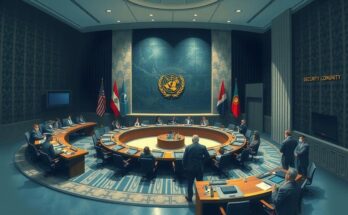Iraqi Prime Minister Mohammed Shia Al-Sudani is set to meet with Shiite Coordination Framework leaders to discuss amendments to the PMF Service and Retirement Law, focusing on retaining senior commanders, safeguarding rights, and minimizing political influence. Ongoing disputes hinder legislative progress, prompting a search for a broader legislative package encompassing various regional concerns. The discussions reflect deeper issues regarding Iranian influence, political neutrality, autonomy, and financial conditions of the PMF.
Iraqi Prime Minister Mohammed Shia Al-Sudani is set to convene with leaders of the Shiite Coordination Framework to deliberate amendments to the Popular Mobilization Forces (PMF) Service and Retirement Law. This meeting aims to revise essential provisions to enhance the retention of senior PMF commanders, protect members’ rights, and establish distinct criteria for ranks and leadership positions.
The proposed amendments aim to reconfigure the PMF as a security entity that operates under the exclusive authority of the Prime Minister, thereby insulating it from political and personal influences in military operations. A spokesperson emphasized that these changes are pivotal to ensuring the PMF remains a professional security force, independent from political maneuvering while ensuring the rights of its fighters are safeguarded.
A senior member of the Coordination Framework also noted the amendments’ importance, stating that they are critical for the PMF’s future and its role as a stabilizing force in Iraq. The aim is to establish unified leadership for the PMF free from external pressures.
Contentions regarding the PMF law have exacerbated existing political divisions in Iraq, resulting in parliamentary paralysis, with lawmakers boycotting multiple sessions, thereby hindering quorum and delaying essential decisions. To mitigate these tensions, Prime Minister Al-Sudani has withdrawn the PMF law from parliamentary discussions.
The Coordination Framework is now considering advancing the PMF law as part of a broader legislative package, yet support from Kurdish parties is contingent upon approval for laws related to Halabja, and Sunni factions require the passage of de-Baathification legislation.
Disagreements surrounding the PMF law focus on various contentious issues. A significant concern is the perceived political influence and Iran’s involvement, with critics apprehensive about the PMF’s operations amid fears of undermining Iraqi sovereignty.
Moreover, the PMF’s political engagement raises questions about the integrity of state institutions and whether it should merge with Iraqi armed forces or maintain independence. Diverging opinions exist on the necessary level of government oversight, with some favoring increased supervision and others advocating for autonomy.
Furthermore, the PMF faces financial debates regarding funding sources, with calls for enhanced government support and suggestions for alternative financing. Discrepancies also persist regarding salaries, with proposals for PMF compensation to match that of the Iraqi army, while others argue for sustaining lower payment levels.
The proposed amendments to the PMF law aim to establish clear leadership and protect the rights of PMF members while ensuring its operational independence from political pressures. The ongoing disputes surrounding the law highlight significant concerns about Iranian influence, the PMF’s political role, and financial matters, further complicating the political landscape in Iraq. Ultimately, forging a bipartisan approach toward these amendments could promote stability within the country.
Original Source: shafaq.com




